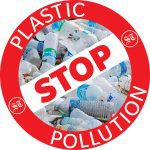Prominent environmental NGOs and social enterprises, including U-recycle Initiative Africa, Plogging Nigeria, and Green With Grin have declared support for the ban on styrofoam and single-use plastic in Lagos State.
These youth-led organizations, known for their dedication to promoting environmental stewardship, have been at the forefront of raising awareness about climate change, organizing weekly cleanups across universities, and developing innovative solutions to combat the plastic pollution crisis in Lagos. With their efforts reaching over 25,000 youths and children in the state, they commend the Lagos State Government for taking decisive action in addressing the environmental challenges posed by styrofoam.
Styrofoam, commonly known as “takeaways,” has long been a popular packaging material. However, its non-biodegradable nature has severe consequences for the environment, contributing to pollution, blockage of drainages, and posing threats to marine life.
The ban is a proactive response to these environmental and health risks, especially concerning the leaching of styrene monomers into stored food.
Recognising that grassroots efforts alone are insufficient to combat the plastic pollution crisis, the Lagos State Government’s decision to ban styrofoam aligns with the collective vision for a cleaner and more sustainable future. This move is crucial, as it signifies a commitment to environmental policies and systems that can effectively complement local initiatives.

Drawing inspiration from successful environmental policies implemented across Africa, such as Rwanda’s ban on plastic bags in 2008, environmentalists believe that Lagos can become a beacon of environmental sustainability. Despite potential challenges for businesses and individuals, the NGOs propose eco-friendly alternatives like reusable food packaging and biodegradable materials.
As Lagos takes this significant step towards a greener future, there is an urgent call for the rigorous implementation of this policy. The ban is not only a positive stride towards reducing environmental pollution but also a move to preserve marine life and transition of Lagos into a circular economy. This decision sets a commendable example for other states in Nigeria, encouraging them to prioritize environmental sustainability in their policies and practices.
Prominent environmental NGOs and social enterprises, including U-recycle Initiative Africa, Plogging Nigeria, and Green With Grin have declared support for the ban on styrofoam and single-use plastic in Lagos State.
These youth-led organizations, known for their dedication to promoting environmental stewardship, have been at the forefront of raising awareness about climate change, organizing weekly cleanups across universities, and developing innovative solutions to combat the plastic pollution crisis in Lagos. With their efforts reaching over 25,000 youths and children in the state, they commend the Lagos State Government for taking decisive action in addressing the environmental challenges posed by styrofoam.
Styrofoam, commonly known as “takeaways,” has long been a popular packaging material. However, its non-biodegradable nature has severe consequences for the environment, contributing to pollution, blockage of drainages, and posing threats to marine life.
The ban is a proactive response to these environmental and health risks, especially concerning the leaching of styrene monomers into stored food.
Recognising that grassroots efforts alone are insufficient to combat the plastic pollution crisis, the Lagos State Government’s decision to ban styrofoam aligns with the collective vision for a cleaner and more sustainable future. This move is crucial, as it signifies a commitment to environmental policies and systems that can effectively complement local initiatives.

Drawing inspiration from successful environmental policies implemented across Africa, such as Rwanda’s ban on plastic bags in 2008, environmentalists believe that Lagos can become a beacon of environmental sustainability. Despite potential challenges for businesses and individuals, the NGOs propose eco-friendly alternatives like reusable food packaging and biodegradable materials.
As Lagos takes this significant step towards a greener future, there is an urgent call for the rigorous implementation of this policy. The ban is not only a positive stride towards reducing environmental pollution but also a move to preserve marine life and transition of Lagos into a circular economy. This decision sets a commendable example for other states in Nigeria, encouraging them to prioritize environmental sustainability in their policies and practices.
Prominent environmental NGOs and social enterprises, including U-recycle Initiative Africa, Plogging Nigeria, and Green With Grin have declared support for the ban on styrofoam and single-use plastic in Lagos State.
These youth-led organizations, known for their dedication to promoting environmental stewardship, have been at the forefront of raising awareness about climate change, organizing weekly cleanups across universities, and developing innovative solutions to combat the plastic pollution crisis in Lagos. With their efforts reaching over 25,000 youths and children in the state, they commend the Lagos State Government for taking decisive action in addressing the environmental challenges posed by styrofoam.
Styrofoam, commonly known as “takeaways,” has long been a popular packaging material. However, its non-biodegradable nature has severe consequences for the environment, contributing to pollution, blockage of drainages, and posing threats to marine life.
The ban is a proactive response to these environmental and health risks, especially concerning the leaching of styrene monomers into stored food.
Recognising that grassroots efforts alone are insufficient to combat the plastic pollution crisis, the Lagos State Government’s decision to ban styrofoam aligns with the collective vision for a cleaner and more sustainable future. This move is crucial, as it signifies a commitment to environmental policies and systems that can effectively complement local initiatives.

Drawing inspiration from successful environmental policies implemented across Africa, such as Rwanda’s ban on plastic bags in 2008, environmentalists believe that Lagos can become a beacon of environmental sustainability. Despite potential challenges for businesses and individuals, the NGOs propose eco-friendly alternatives like reusable food packaging and biodegradable materials.
As Lagos takes this significant step towards a greener future, there is an urgent call for the rigorous implementation of this policy. The ban is not only a positive stride towards reducing environmental pollution but also a move to preserve marine life and transition of Lagos into a circular economy. This decision sets a commendable example for other states in Nigeria, encouraging them to prioritize environmental sustainability in their policies and practices.
Prominent environmental NGOs and social enterprises, including U-recycle Initiative Africa, Plogging Nigeria, and Green With Grin have declared support for the ban on styrofoam and single-use plastic in Lagos State.
These youth-led organizations, known for their dedication to promoting environmental stewardship, have been at the forefront of raising awareness about climate change, organizing weekly cleanups across universities, and developing innovative solutions to combat the plastic pollution crisis in Lagos. With their efforts reaching over 25,000 youths and children in the state, they commend the Lagos State Government for taking decisive action in addressing the environmental challenges posed by styrofoam.
Styrofoam, commonly known as “takeaways,” has long been a popular packaging material. However, its non-biodegradable nature has severe consequences for the environment, contributing to pollution, blockage of drainages, and posing threats to marine life.
The ban is a proactive response to these environmental and health risks, especially concerning the leaching of styrene monomers into stored food.
Recognising that grassroots efforts alone are insufficient to combat the plastic pollution crisis, the Lagos State Government’s decision to ban styrofoam aligns with the collective vision for a cleaner and more sustainable future. This move is crucial, as it signifies a commitment to environmental policies and systems that can effectively complement local initiatives.

Drawing inspiration from successful environmental policies implemented across Africa, such as Rwanda’s ban on plastic bags in 2008, environmentalists believe that Lagos can become a beacon of environmental sustainability. Despite potential challenges for businesses and individuals, the NGOs propose eco-friendly alternatives like reusable food packaging and biodegradable materials.
As Lagos takes this significant step towards a greener future, there is an urgent call for the rigorous implementation of this policy. The ban is not only a positive stride towards reducing environmental pollution but also a move to preserve marine life and transition of Lagos into a circular economy. This decision sets a commendable example for other states in Nigeria, encouraging them to prioritize environmental sustainability in their policies and practices.
Prominent environmental NGOs and social enterprises, including U-recycle Initiative Africa, Plogging Nigeria, and Green With Grin have declared support for the ban on styrofoam and single-use plastic in Lagos State.
These youth-led organizations, known for their dedication to promoting environmental stewardship, have been at the forefront of raising awareness about climate change, organizing weekly cleanups across universities, and developing innovative solutions to combat the plastic pollution crisis in Lagos. With their efforts reaching over 25,000 youths and children in the state, they commend the Lagos State Government for taking decisive action in addressing the environmental challenges posed by styrofoam.
Styrofoam, commonly known as “takeaways,” has long been a popular packaging material. However, its non-biodegradable nature has severe consequences for the environment, contributing to pollution, blockage of drainages, and posing threats to marine life.
The ban is a proactive response to these environmental and health risks, especially concerning the leaching of styrene monomers into stored food.
Recognising that grassroots efforts alone are insufficient to combat the plastic pollution crisis, the Lagos State Government’s decision to ban styrofoam aligns with the collective vision for a cleaner and more sustainable future. This move is crucial, as it signifies a commitment to environmental policies and systems that can effectively complement local initiatives.

Drawing inspiration from successful environmental policies implemented across Africa, such as Rwanda’s ban on plastic bags in 2008, environmentalists believe that Lagos can become a beacon of environmental sustainability. Despite potential challenges for businesses and individuals, the NGOs propose eco-friendly alternatives like reusable food packaging and biodegradable materials.
As Lagos takes this significant step towards a greener future, there is an urgent call for the rigorous implementation of this policy. The ban is not only a positive stride towards reducing environmental pollution but also a move to preserve marine life and transition of Lagos into a circular economy. This decision sets a commendable example for other states in Nigeria, encouraging them to prioritize environmental sustainability in their policies and practices.
Prominent environmental NGOs and social enterprises, including U-recycle Initiative Africa, Plogging Nigeria, and Green With Grin have declared support for the ban on styrofoam and single-use plastic in Lagos State.
These youth-led organizations, known for their dedication to promoting environmental stewardship, have been at the forefront of raising awareness about climate change, organizing weekly cleanups across universities, and developing innovative solutions to combat the plastic pollution crisis in Lagos. With their efforts reaching over 25,000 youths and children in the state, they commend the Lagos State Government for taking decisive action in addressing the environmental challenges posed by styrofoam.
Styrofoam, commonly known as “takeaways,” has long been a popular packaging material. However, its non-biodegradable nature has severe consequences for the environment, contributing to pollution, blockage of drainages, and posing threats to marine life.
The ban is a proactive response to these environmental and health risks, especially concerning the leaching of styrene monomers into stored food.
Recognising that grassroots efforts alone are insufficient to combat the plastic pollution crisis, the Lagos State Government’s decision to ban styrofoam aligns with the collective vision for a cleaner and more sustainable future. This move is crucial, as it signifies a commitment to environmental policies and systems that can effectively complement local initiatives.

Drawing inspiration from successful environmental policies implemented across Africa, such as Rwanda’s ban on plastic bags in 2008, environmentalists believe that Lagos can become a beacon of environmental sustainability. Despite potential challenges for businesses and individuals, the NGOs propose eco-friendly alternatives like reusable food packaging and biodegradable materials.
As Lagos takes this significant step towards a greener future, there is an urgent call for the rigorous implementation of this policy. The ban is not only a positive stride towards reducing environmental pollution but also a move to preserve marine life and transition of Lagos into a circular economy. This decision sets a commendable example for other states in Nigeria, encouraging them to prioritize environmental sustainability in their policies and practices.
Prominent environmental NGOs and social enterprises, including U-recycle Initiative Africa, Plogging Nigeria, and Green With Grin have declared support for the ban on styrofoam and single-use plastic in Lagos State.
These youth-led organizations, known for their dedication to promoting environmental stewardship, have been at the forefront of raising awareness about climate change, organizing weekly cleanups across universities, and developing innovative solutions to combat the plastic pollution crisis in Lagos. With their efforts reaching over 25,000 youths and children in the state, they commend the Lagos State Government for taking decisive action in addressing the environmental challenges posed by styrofoam.
Styrofoam, commonly known as “takeaways,” has long been a popular packaging material. However, its non-biodegradable nature has severe consequences for the environment, contributing to pollution, blockage of drainages, and posing threats to marine life.
The ban is a proactive response to these environmental and health risks, especially concerning the leaching of styrene monomers into stored food.
Recognising that grassroots efforts alone are insufficient to combat the plastic pollution crisis, the Lagos State Government’s decision to ban styrofoam aligns with the collective vision for a cleaner and more sustainable future. This move is crucial, as it signifies a commitment to environmental policies and systems that can effectively complement local initiatives.

Drawing inspiration from successful environmental policies implemented across Africa, such as Rwanda’s ban on plastic bags in 2008, environmentalists believe that Lagos can become a beacon of environmental sustainability. Despite potential challenges for businesses and individuals, the NGOs propose eco-friendly alternatives like reusable food packaging and biodegradable materials.
As Lagos takes this significant step towards a greener future, there is an urgent call for the rigorous implementation of this policy. The ban is not only a positive stride towards reducing environmental pollution but also a move to preserve marine life and transition of Lagos into a circular economy. This decision sets a commendable example for other states in Nigeria, encouraging them to prioritize environmental sustainability in their policies and practices.
Prominent environmental NGOs and social enterprises, including U-recycle Initiative Africa, Plogging Nigeria, and Green With Grin have declared support for the ban on styrofoam and single-use plastic in Lagos State.
These youth-led organizations, known for their dedication to promoting environmental stewardship, have been at the forefront of raising awareness about climate change, organizing weekly cleanups across universities, and developing innovative solutions to combat the plastic pollution crisis in Lagos. With their efforts reaching over 25,000 youths and children in the state, they commend the Lagos State Government for taking decisive action in addressing the environmental challenges posed by styrofoam.
Styrofoam, commonly known as “takeaways,” has long been a popular packaging material. However, its non-biodegradable nature has severe consequences for the environment, contributing to pollution, blockage of drainages, and posing threats to marine life.
The ban is a proactive response to these environmental and health risks, especially concerning the leaching of styrene monomers into stored food.
Recognising that grassroots efforts alone are insufficient to combat the plastic pollution crisis, the Lagos State Government’s decision to ban styrofoam aligns with the collective vision for a cleaner and more sustainable future. This move is crucial, as it signifies a commitment to environmental policies and systems that can effectively complement local initiatives.

Drawing inspiration from successful environmental policies implemented across Africa, such as Rwanda’s ban on plastic bags in 2008, environmentalists believe that Lagos can become a beacon of environmental sustainability. Despite potential challenges for businesses and individuals, the NGOs propose eco-friendly alternatives like reusable food packaging and biodegradable materials.
As Lagos takes this significant step towards a greener future, there is an urgent call for the rigorous implementation of this policy. The ban is not only a positive stride towards reducing environmental pollution but also a move to preserve marine life and transition of Lagos into a circular economy. This decision sets a commendable example for other states in Nigeria, encouraging them to prioritize environmental sustainability in their policies and practices.














